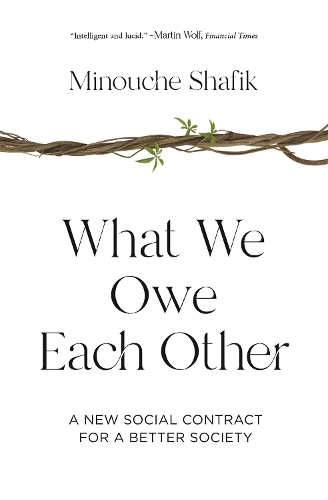
What We Owe Each Other: A New Social Contract for a Better Society
(Paperback)
Available Formats
Publishing Details
What We Owe Each Other: A New Social Contract for a Better Society
By (Author) Minouche Shafik
Princeton University Press
Princeton University Press
1st November 2022
United States
Classifications
Professional and Scholarly
Non Fiction
Political science and theory
Central / national / federal government policies
Social and political philosophy
Social and ethical issues
320.11
Physical Properties
Paperback
256
Width 133mm, Height 203mm
Description
From one of the leading policy experts of our time, an urgent rethinking of how we can better support each other to thrive.
Whether we realize it or not, all of us participate in the social contract every day through mutual obligations among our family, community, place of work, and fellow citizens. Caring for others, paying taxes, and benefiting from public services define the social contract that supports and binds us together as a society. Today, however, our social contract has been broken by changing gender roles, technology, new models of work, aging, and the perils of climate change.
Minouche Shafik takes us through stages of life we all experience raising children, getting educated, falling ill, working, growing old and shows how a reordering of our societies is possible. Drawing on evidence and examples from around the world, she shows how every country can provide citizens with the basics to have a decent life and be able to contribute to society. But we owe each other more than this. A more generous and inclusive society would also share more risks collectively and ask everyone to contribute for as long as they can so that everyone can fulfil their potential. What We Owe Each Other identifies the key elements of a better social contract that recognizes our interdependencies, supports and invests more in each other, and expects more of individuals in return.
Powerful, hopeful, and thought-provoking, What We Owe Each Other provides practical solutions to current challenges and demonstrates how we can build a better society together.
Reviews
"Longlisted for the Financial Times and McKinsey & Company Business Book of the Year Award"
"In this intelligent and lucid book, she calls for a new social contract based on three principles: security for all; investment in capability; and efficient and fair sharing of risks."---Martin Wolf, Financial Times
"In her new book What We Owe Each Other: A New Social Contract, Minouche Shafik reviews where we stand, and quotes Yeats: surely some revelation is at hand. The revelation required is that of an inextricably interlinked society."---Justin Welby, Archbishop of Canterbury, Prospect
"Offer[s] a persuasive diagnosis of the present social malaise and offer[s] plenty of suggestions about what policymakers could do."---Diane Coyle, Financial Times
"Books dealing with the social contract often tend to be soothing, even soppy. They quote Rousseau and construct grand theories. Minouche Shafik brilliantly avoids this pitfall, simply defining the social contract as what we can expect, in society, from each other."---Julien Damon, Telos
"What We Owe Each Other articulates why, when, and how government policies can help society reach its goals. Shafik wields her compelling personal experience and a wealth of academic research to argue for a more robust social contract and renewed commitment to shared responsibility. Readers will be left cautiously hopeful that governments can be a force for good and that a better tomorrow is possible."---Andrew Stevens, The Christian Century
"What We Owe Each Other is data-driven, immensely informative, insightful, and provocative."---Glenn C. Altschuler, Psychology Today
"An appeal to use the occasion of the pandemic to recast our view of rights and obligations. . . . A welcome update of Rousseau-vian ideals of duty, responsibility, and reciprocity." * Kirkus Reviews *
"A persuasive argument for a new social contract to address modern inequalities and dissatisfaction." * Shelf Awareness *
"Progressive, pragmatic, and deeply empathetic." * Fast Company Magazine *
"An intelligent and honest attempt to tackle a broad range of problems"---John Phelan, American Experiment
Author Bio
Minouche Shafik is Director of the London School of Economics and Political Science. She was Vice President of the World Bank, Permanent Secretary of the Department for International Development, Deputy Managing Director of the International Monetary Fund, and Deputy Governor of the Bank of England.
